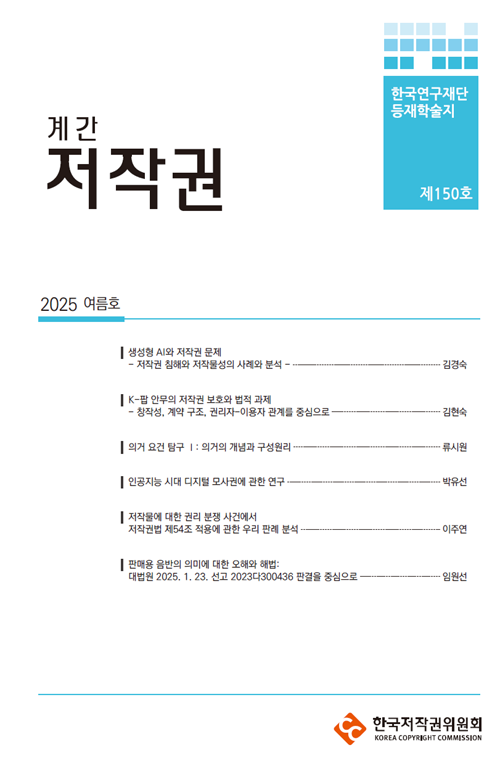- 영문명
- Rethinking Dependence (Copying) Requirement, Part Ⅰ: Its Conceptual Construction
- 발행기관
- 한국저작권위원회
- 저자명
- 류시원(Shiwon Ryu)
- 간행물 정보
- 『계간 저작권』150호(38권 2호), 93~140쪽, 전체 48쪽
- 주제분류
- 법학 > 민법
- 파일형태
- 발행일자
- 2025.06.30
무료
구매일시로부터 72시간 이내에 다운로드 가능합니다.
이 학술논문 정보는 (주)교보문고와 각 발행기관 사이에 저작물 이용 계약이 체결된 것으로, 교보문고를 통해 제공되고 있습니다.

국문 초록
의거는 저작재산권 고유의 상대적 성격을 구현하는 침해의 핵심 요건이다. 그러나 다른 침해 요건인 실질적 유사성과 비교할 때, 의거 요건 의미와 법적 성격에 관해서는충분한 검토가 이루어지지 않았고, 그에 따라 구체적 근거 없이 의거를 주관적 요건이라고 부르는 것이 지배적 경향이 되었다. 이 글은 역사적, 비교법적 고찰을 통해 의거가아직 우리나라의 저작권법학에서 완전하게 정립된 개념이 아니고, 다른 나라의 유사 법리를 참고하여 재구성될 여지가 있음을 발견하였다. 이를 기초로 오늘날 의거 요건에 어떤 의미를 부여할 것인지에 대해 검토하였다. 주요 논지 두 가지는 다음과 같다.
첫째, 의거는 객관적 사실 요건으로 재해석되어야 한다. 의거에 주관적 요건이라는성격을 부여하는 것은 기계적 대량 복제의 현실에 부합하지 않고, 비교법적으로도 매우이례적이다. 국내에서도 의거를 주관적 요건으로 취급하는 것에 의문을 표하거나 적극찬동하지는 않는 것으로 보이는 문헌들이 있지만, 의거가 객관적 요건이라고 정면에서주장하거나 어떤 이유에서 그러한지에 대해 직접 논구한 자료는 부족하였다. 의거를 객관적 요건으로 보게 되면 주관설로는 해명하기 어려운 문제 상황들과, 인간의 내면적 심리 탐구를 둘러싼 불필요한 실무적 논쟁을 피할 수 있다는 점을 살펴보았다.
둘째, 객관적 요건으로서 의거는 인과관계적 성격을 본질로 한다. ‘의거관계’라는 표현에서 알 수 있듯이 의거에는 관계적 성격이 뚜렷하며, 그 관계의 내용은 선행 저작물에서 후행 저작물로 이어지는 인과관계이다. 영국 판례가 사용하는 ‘인과적 연결’, ‘유래’ 등의 표현이 의거의 인과관계적 성격을 대변하고, 일본, 미국 등지에서도 유사한 접근이 나타나고 있다. 의거 개념을 구성하는 인과관계는 순수사실적 인과관계이기보다규범적 인과관계로서 구성된다. 따라서 의거관계에 관한 판단은 접근의 합리적 기회를비롯한 다양한 간접사실들을 저작권법 목적에 대한 고려하에서 포섭해 의거 여부를 확정하는 과정이라고 보아야 할 것이다. 현대적 미디어 환경에서 접근가능성이 지나치게쉽게 인정되는 것을 경계하기 위해, 다른 저작물에 대한 접근 기회의 확대가 창작의 새로운 지평을 열 가능성에 관한 균형적인 사고가 의거관계 판단에 작용하여야 한다.
영문 초록
‘Dependence’ (‘Copying’ in the U.S. law) is the very most important requirement of copyright infringement in that it embodies the inherent relative nature of copyright. However, the legal constuction and nature of the dependence has not been sufficiently examined as compared to substantial similarity, which led to the dominant tendency of calling it as a subjective requirement without any concrete basis. Through historical and comparative analysis, this article finds that dependence is not yet a fully established concept in Korean copyright jurisprudence, and there is room for reconstruction thereof by referring to corresponding concepts in other jurisdictions. Two main arguments studied herein are as follows.
First, dependence should be reinterpreted as a factual and an objective requirement. The characterization of dependence as a subjective requirement is inconsistent with the reality of mechanical mass reproduction and is highly anomalous in comparative law. While there is a body of literature in Korea that seems to question or not actively favor treating dependence as a subjective requirement, there is a lack of studies that directly argues that dependence has objective features or discusses why it is so. It is discussed that viewing dependence as an objective requirement helps avoiding some problematic situations that are difficult to explain based on treating it as subjective element, as well as unnecessary practical debates about the inner workings of the human mind.
Second, dependence is constructed as causality as an objective requirement. As the phrase “relationship of depending upon” suggests, dependence is relational in nature, and its content is a causal link from the former work to the later one. The case law in United Kingdom uses expressions such as “causal connection” and “derivation” to characterize the causal nature of the element similar to our dependence, and similar approaches are found in Japan, the United States, and elsewhere. The causality constituting the concept of dependence is organized as a normative causality rather than a purely factual one. Therefore, the determination of dependence should be viewed as a process of subjecting considerations of various indirect facts which include but not limited to reasonable opportunity for access to the purpose of copyright law. There should be provided caution against an overly easy finding of access in the modern media environment, and the judgment of dependence is to be based on a balanced view taking into consideration that expanded opportunities of access to other works may also open up new creative horizons.
목차
Ⅰ. 서론
Ⅱ. 저작재산권 침해 요건으로서 ‘의거’
Ⅲ. 역사적, 비교법적 고찰
Ⅳ. 의거의 개념적 구성원리
Ⅴ. 결론
참고문헌
키워드
해당간행물 수록 논문
참고문헌
교보eBook 첫 방문을 환영 합니다!

신규가입 혜택 지급이 완료 되었습니다.
바로 사용 가능한 교보e캐시 1,000원 (유효기간 7일)
지금 바로 교보eBook의 다양한 콘텐츠를 이용해 보세요!



